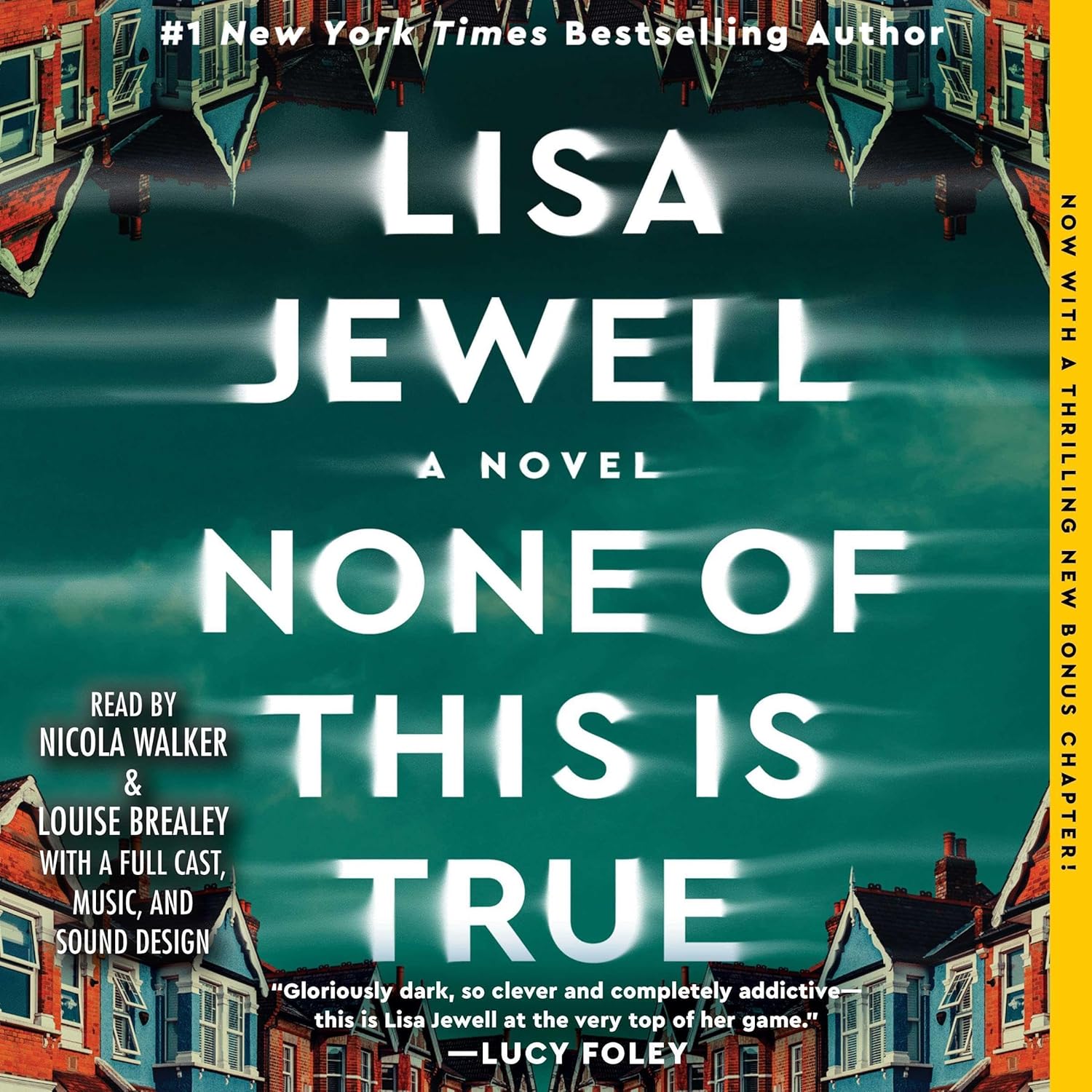Have you ever found yourself drawn to a stranger, a connection sparked by a seemingly innocuous coincidence, only to discover a labyrinth of unsettling truths beneath their surface? Lisa Jewell, the undisputed queen of domestic suspense, masterfully explores this chilling premise in her latest novel, None of This Is True. This isn’t just another thriller; it’s a meticulously crafted psychological puzzle that will burrow into your mind and refuse to let go long after you’ve turned the final page. For anyone seeking a truly immersive and thought-provoking read, this None of This Is True book review will give you a glimpse into why it should be at the top of your must-read list.
Jewell has built a formidable reputation for her ability to peel back the layers of seemingly ordinary lives, exposing the darkness and secrets festering beneath. With None of This Is True, she elevates her game, delivering a narrative that is both profoundly unsettling and utterly compelling. From the very first chapter, you’re plunged into a world where reality is fluid, and trust is a dangerous commodity.
The Unsettling Premise: What is None of This Is True About?
The story introduces us to Alix Summers, a successful podcaster known for her series “The Birthday Club,” which features women celebrating their 45th birthdays and reflecting on their lives. Alix’s own life, with a loving husband, two children, and a comfortable home, appears enviably stable and happy. Then, by chance, she meets Josie Fair. The encounter is innocuous enough: both women are celebrating their 45th birthdays at the same pub, born on the same day, in the same year, at the same hospital. A “birthday twin,” as Josie enthusiastically proclaims.
What begins as a quirky coincidence quickly spirals into something far more sinister. Josie, who seems both vulnerable and strangely manipulative, expresses an intense admiration for Alix’s work and suggests she herself would make an excellent subject for a new podcast. Despite her initial reservations about Josie’s unnerving intensity and oddly unsettling demeanor, Alix, sensing a compelling story, agrees. Josie promises a raw, honest account of her life – a life she describes as being “on the cusp of great changes.”
As Alix begins to record Josie’s story, she unearths disturbing details about Josie’s marriage to Walter, her troubled daughters Erin and Roxy, and a childhood steeped in neglect and manipulation. Josie’s narrative is a dark tapestry of secrets, abuse, and resentment. But the more Alix digs, the more she questions the veracity of Josie’s claims. Is Josie a victim, a masterful deceiver, or a combination of both?
The true horror begins when Josie, claiming to be in danger from her husband, inveigles her way into Alix’s seemingly idyllic home. Alix finds herself caught in a psychological cat-and-mouse game, her sanctuary violated, and her own perfect life beginning to unravel. Josie’s presence is a catalyst, exposing cracks in Alix’s marriage and forcing her to confront uncomfortable truths about herself and those closest to her. When Josie abruptly disappears, leaving chaos in her wake, Alix realizes with chilling clarity that she has become not just an interviewer, but the unwitting subject of her own true crime narrative. This becomes the central question driving the latter half of the book: what exactly happened, and how much of it was real?
Characters You Won’t Forget: A Study in Unreliability
At the heart of None of This Is True are its two compelling, yet deeply flawed, protagonists: Alix Summers and Josie Fair. Their dynamic forms the backbone of the novel, and Jewell masterfully uses their interactions to explore themes of identity, perception, and the elusive nature of truth.
Alix and Josie: A Tangled Web of Obsession
Alix Summers embodies the modern woman who seemingly has it all. She’s successful, financially comfortable, and projects an image of domestic bliss. Her podcast delves into the lives of others, allowing her to maintain a professional distance while exploring complex human experiences. Yet, beneath the polished exterior, Alix harbors her own vulnerabilities and a quiet yearning for something more, or perhaps just something different. Her curiosity, a professional asset, becomes her greatest weakness when confronted with Josie. Alix’s journey through the book is one of gradual awakening, as her carefully constructed world crumbles under the weight of Josie’s influence. She struggles with her own moral compass, grappling with the ethical implications of her podcast and the personal cost of delving into another’s dark world.
Josie Fair, on the other hand, is a character designed to unsettle and intrigue. From their first meeting, Josie radiates an awkward intensity, a thirst for connection that borders on obsession. She is the epitome of the unreliable narrator, her stories shifting, contradictory, and deeply disturbing. We glimpse her life through her own words and through the filtered perceptions of others, leaving the reader constantly questioning what is real and what is a fabrication. Josie is a chameleon, adapting her narrative to suit her needs, pulling Alix (and the reader) deeper into her psychological games. Her past, marred by what she claims is abuse and neglect, fuels her desperate need for validation and control. Her motivations are complex and often contradictory, making her a truly fascinating and terrifying character to unravel.
Supporting Cast and Their Roles
While Alix and Josie dominate the stage, the supporting characters in None of This Is True play crucial roles in complicating the narrative and deepening the mystery. Walter, Josie’s much older husband, is painted as either a controlling abuser or a bewildered victim, depending on whose perspective you’re reading. His presence adds layers to Josie’s backstory and the domestic horrors she describes. Nathan, Alix’s husband, is initially presented as her rock, but Josie’s intrusion, coupled with his own past struggles, begins to expose vulnerabilities in their marriage. The daughters, Erin and Roxy, provide fleeting glimpses into Josie’s family life, their perspectives offering alternative (though equally questionable) interpretations of events. These characters are not merely props; they are essential pieces in Jewell’s intricate puzzle, each contributing to the ambiguity and suspense that defines the novel.
Themes Explored: Beyond the Surface
None of This Is True is more than just a gripping thriller; it’s a shrewd exploration of several timely and provocative themes that resonate deeply in our modern, media-saturated world. This None of This Is True book review would be incomplete without delving into the thought-provoking ideas Jewell presents.
The Elusive Nature of Truth
Perhaps the most prominent theme is the slipperiness of truth and the power of narrative. Through Josie’s constantly shifting accounts and the interweaving of podcast interviews, police interrogations, and documentary footage, Jewell forces the reader to confront the idea that truth is often subjective and malleable. Who do you believe when everyone has a motive, a bias, or a different version of events? The novel skillfully demonstrates how easily perception can be manipulated, both by individuals and by the media. It’s a testament to Jewell’s writing that the reader is left questioning everything, constantly trying to piece together a reality that remains stubbornly out of reach.
Social Media and the Cult of Personality
The role of social media is subtly but powerfully woven into the fabric of the story. Alix’s carefully curated online persona, her public-facing “perfect life,” is precisely what draws Josie to her. The novel hints at the dangers of presenting an idealized version of oneself online, as it can attract unwanted attention and blur the lines between public and private. Josie’s fascination with Alix’s life, gleaned from social media, highlights how easily boundaries can be breached in the digital age, and how a seemingly harmless online presence can become a target for obsession.
Obsession and Its Dark Underbelly
Josie’s obsession with Alix is the engine that drives the plot’s descent into psychological horror. It begins with admiration, then morphs into an unnerving fixation, a desire to inhabit Alix’s life. This theme explores the destructive power of unchecked obsession – how it can warp perception, justify heinous acts, and ultimately consume both the obsessed and their target. The novel chillingly illustrates how a seemingly harmless interest can escalate into something terrifying, stripping away agency and leaving a trail of devastation.
Domestic Secrets and Hidden Lives
Like many of Jewell’s novels, None of This Is True delves deep into the hidden dysfunction of domestic life. Both Alix’s and Josie’s families harbor secrets, resentments, and unresolved traumas. The book examines how these hidden aspects can erode relationships from within, and how the desire to maintain a façade of normalcy can lead to profound unhappiness and destructive behaviors. It’s a stark reminder that even the most seemingly perfect lives can conceal profound darkness.
Language and Narrative Style: A Masterclass in Suspense
Lisa Jewell’s writing in None of This Is True is a clinic in psychological suspense. Her prose is clean, direct, and incredibly effective at building tension and unease. The narrative style is one of the book’s greatest strengths, keeping the reader disoriented and engaged from beginning to end.
A Masterclass in Pacing
The pacing is relentless. Jewell employs short, sharp chapters, often shifting perspectives and timelines, which creates an almost breathless urgency. Each chapter ends with a hook, compelling you to read “just one more.” This propulsive momentum ensures that the book is nearly impossible to put down. Even in moments of apparent calm, an underlying current of dread pulses through the prose, signaling that something is deeply, irrevocably wrong.
The Multi-Layered Narrative
What truly sets None of This Is True apart is its innovative narrative structure. The story is told through multiple lenses: traditional third-person narration primarily following Alix, but crucially, it’s interspersed with snippets of a true-crime podcast (Alix’s new series featuring Josie), transcripts of police interviews, and even sections from a documentary series about the events that unfold. This fragmented, multi-layered approach enhances the theme of unreliable narration. Each “source” offers a slightly different version of events, a skewed perspective, making it impossible for the reader to definitively grasp the truth. It’s a brilliant device that immerses you in the psychological confusion experienced by the characters and leaves you constantly questioning the credibility of every voice. The shift between these formats feels natural and serves to deepen the mystery, making the reader an active participant in piecing together the fractured reality.
Strengths of None of This Is True: Why It Shines
This None of This Is True book review wholeheartedly recommends it for several compelling reasons:
- Unpredictability and Suspense: Jewell keeps you guessing at every turn. Just when you think you have a handle on the truth, she pulls the rug out from under you. The twists are genuinely shocking, and the suspense is expertly maintained throughout. You’ll find yourself theorizing, only to be proven wrong again and again.
- Complex and Flawed Characters: Alix and Josie are incredibly well-developed, with layers of complexity that make them feel unsettlingly real. Their flaws and vulnerabilities are exposed, making their downward spirals all the more compelling (and horrifying) to witness. The book excels at portraying the insidious nature of manipulation and how easily even seemingly strong individuals can be ensnared.
- Unique Narrative Structure: The integration of the podcast and documentary elements isn’t just a gimmick; it’s fundamental to the novel’s thematic exploration of truth and media. It’s a fresh and effective way to tell a psychological thriller, making the reading experience dynamic and interactive.
- Timely and Relevant Themes: The book’s exploration of obsession, social media’s darker side, and the fluidity of truth feels incredibly pertinent in today’s world. It’s a psychological thriller that also offers a subtle commentary on modern society.
- The Ending: While some readers might crave a more definitive resolution, the ambiguous nature of the ending is a stroke of genius. It perfectly encapsulates the book’s central theme that some truths remain elusive, and it leaves a lasting, chilling impression. This None of This Is True book review particularly appreciates an ending that sparks continued thought and discussion.
A Few Minor Weaknesses (A Balanced Perspective)
While None of This Is True is undeniably a triumph, a balanced None of This Is True book review should acknowledge that no book is perfect for every reader.
- Pacing in Early Chapters: Some readers might find the initial setup a tad slow as Alix and Josie’s relationship develops. However, this groundwork is crucial for the intensity that follows, so patience is rewarded.
- The “Unlikable” Factor: Given the nature of psychological thrillers, some characters (especially Josie) are designed to be unsettling or even unlikable. Readers who prefer protagonists they can fully root for might find this challenging. However, their complexity is precisely what makes them compelling.
- Ambiguous Resolution: As mentioned, the ending leaves some questions unanswered. While this is intentional and effective for many, those who prefer a neat, tied-up conclusion might feel a sense of lingering dissatisfaction. It’s a book that demands you ponder its implications long after the final page.
What Readers Are Saying
Across Goodreads and Amazon, the consensus is clear: None of This Is True is a riveting and disturbing read. Here’s a glimpse of common sentiments:
- “Absolutely devoured None of This Is True. Lisa Jewell is a master of suspense, and this one kept me guessing until the very end. The podcast format was brilliant!” – Goodreads Reviewer
- “So unsettling and addictive! Josie Fair is a character I won’t forget anytime soon. My mind was spinning trying to figure out what was real. Highly recommend for thriller fans.” – Amazon Customer
- “This book is a wild ride. The psychological games are next level. It made me question everything about truth and perception. Prepare to be disturbed in the best way.” – Book Blogger
- “Lisa Jewell does it again! The pacing was perfect, the characters were deeply flawed yet fascinating. A truly chilling read that stays with you.” – Fiction Fanatic
Should You Read None of This Is True?
Absolutely. If you’re a fan of psychological thrillers that delve deep into the human psyche, twist your perceptions, and keep you on the edge of your seat, then None of This Is True is an essential read. Lisa Jewell has delivered another masterpiece of suspense, a chilling exploration of obsession, identity, and the unsettling nature of truth in our modern world.
This isn’t a book for passive reading; it demands your full attention, drawing you into its intricate web of lies and half-truths. You’ll find yourself questioning everything you thought you knew, long after you’ve closed the cover.
So, go ahead. Pick up your copy of None of This Is True. But be warned: once you start unraveling Josie Fair’s story, there’s no telling where the truth will lead you, or what unsettling revelations you might uncover about the characters, and perhaps even about yourself. This None of This Is True book review can only scratch the surface of the psychological depth and thrilling ride that awaits. Don’t miss out on one of the most talked-about thrillers of the year!
“Enjoyed this review? Discover more in our Mystery Reviews section.”





